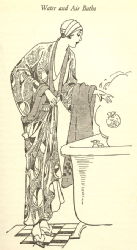Shaping the New Woman: Women's Health, 1870-1930
|
Professor Hilary Marland
Professor Marland's project will address the issue of how women sought to inform themselves about their bodies, attempted to deal with gynaecological problems and other health matters, and how access to information changed during this period, as literature on the topic of women’s health proliferated. Some of the publications on gynaecology and hygiene were directed specifically towards the education of mothers and daughters on diseases of the uterine organs. Though many focused on preparing women for motherhood, it was also argued that a good understanding of their reproductive systems was necessary for women to achieve their full potential in public life. Both ‘orthodox’ and ‘alternative’ medical practice generated a wide range of literature teaching women how to prevent disease and to regulate their potentially disordered bodies. As women increasingly entered higher education and paid employment, more attention was paid to the importance of hygiene, regularity, exercise and strength of body and mind to carry out new tasks. The project will focus on the late Victorian period to 1930, focusing on how advice literature for women shifted to take on board new social realities linking health to women’s education and work, and shifting emphasis from maternity alone to women’s broader functions. |


 This new project will explore the popularisation of health knowledge for women, examining the growing body of advice literature generated in the late nineteenth and early twentieth centuries. This advice was put forward across a range of media, including the publications of general practitioners and gynaecologists, homoeopathists, herbalists, medical botanists, and hydropathic practitioners intended for a mass audience, in midwifery manuals, recipe books, women’s magazines, birth control literature, beauty manuals, newspapers, and posters and advertisements for medicines and health and beauty preparations.
This new project will explore the popularisation of health knowledge for women, examining the growing body of advice literature generated in the late nineteenth and early twentieth centuries. This advice was put forward across a range of media, including the publications of general practitioners and gynaecologists, homoeopathists, herbalists, medical botanists, and hydropathic practitioners intended for a mass audience, in midwifery manuals, recipe books, women’s magazines, birth control literature, beauty manuals, newspapers, and posters and advertisements for medicines and health and beauty preparations.